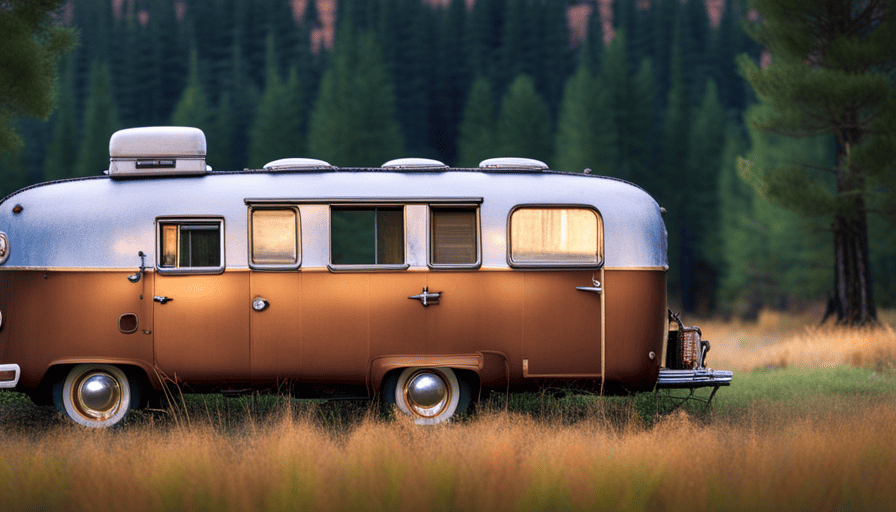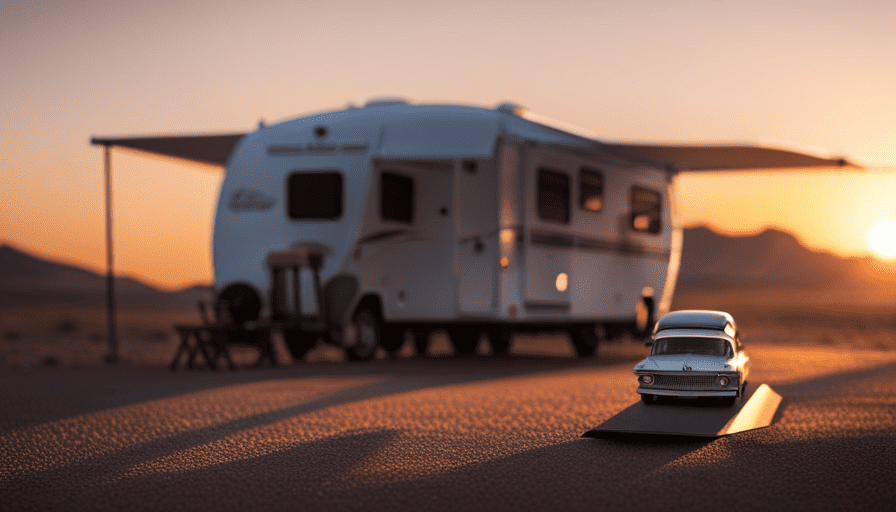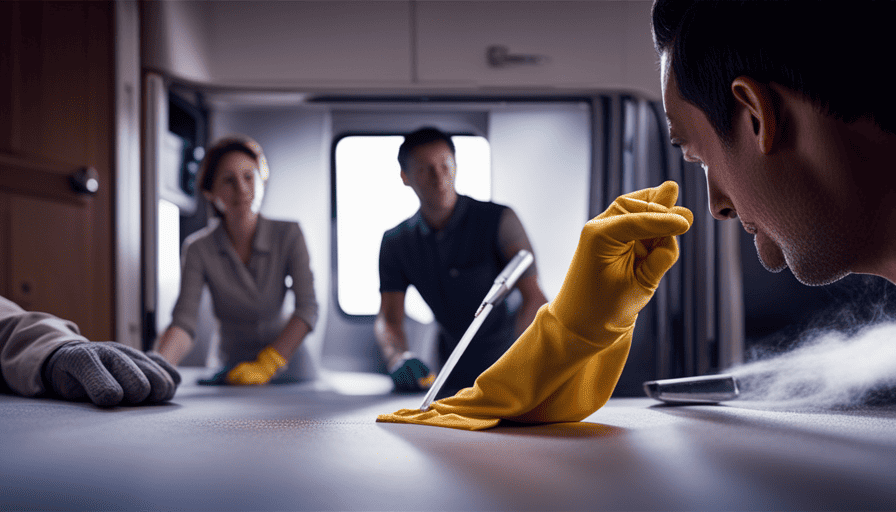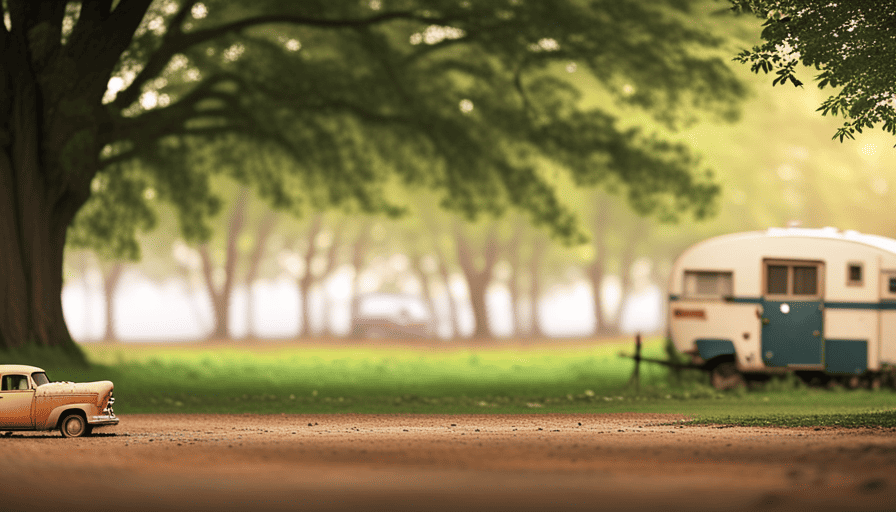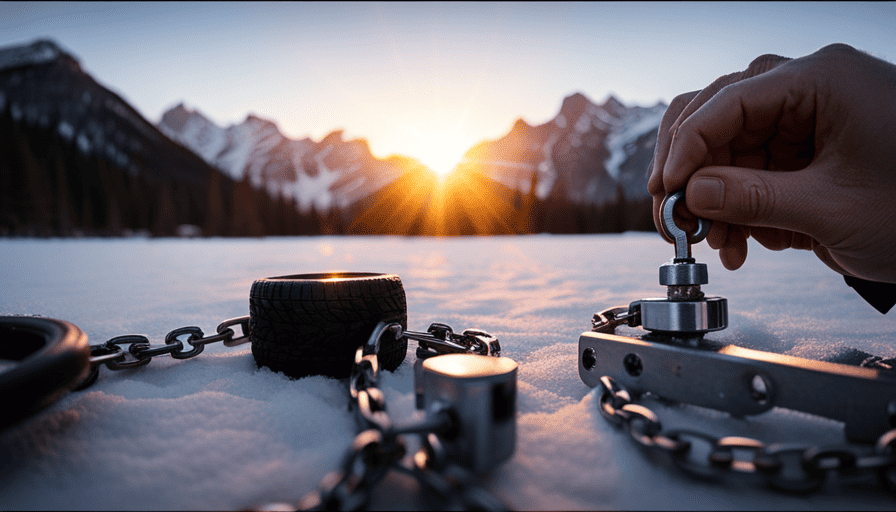Did you know that on average, a camper’s lifespan is about 15-20 years?
That’s right, these versatile vehicles can provide years of adventure and outdoor exploration. As a seasoned camper enthusiast, I have witnessed firsthand the durability and longevity of these recreational vehicles.
However, it’s important to note that the lifespan of a camper depends on various factors, including the type of camper, regular maintenance, and care.
In this article, I will delve into the factors that affect the lifespan of a camper, provide maintenance and care tips to extend its longevity, discuss common problems and repairs, and highlight signs that indicate your camper may need replacement or upgrades.
By implementing the strategies and techniques I will share, you can ensure that your camper lasts for many years of memorable camping trips and experiences.
So, let’s dive in and discover how to make the most of your camper’s lifespan!
Key Takeaways
- The average lifespan of a camper is typically 15-20 years, but this can vary depending on factors such as weather conditions, maintenance practices, and frequency of use.
- Different camper types have varying levels of durability, with motorhomes being the most durable.
- Regular maintenance and care, including cleaning, sealing, and regular inspections, are essential for extending the lifespan of a camper.
- Signs for replacement or upgrades include excessive wear and tear, outdated technology or amenities, and the overall condition of the camper. Assessing the costs of repairs and upgrades is important in making this decision.
Factors that Affect the Lifespan of a Camper
A camper’s lifespan can be influenced by various factors, such as weather conditions, maintenance practices, and frequency of use. These factors play a crucial role in determining the durability of a camper and how long it will last.
Weather conditions can have a significant impact on a camper’s lifespan. Exposure to extreme weather, such as heavy rain, strong winds, and intense sunlight, can cause wear and tear on the exterior of the camper. Over time, this can lead to leaks, rust, and other structural issues. Additionally, extreme temperatures can affect the integrity of the camper’s materials, causing them to deteriorate faster.
Regular maintenance is also essential for prolonging the lifespan of a camper. By conducting routine inspections and addressing any issues promptly, you can prevent small problems from turning into major ones. Regular cleaning, waxing, and sealing can help protect the camper from dirt, grime, and UV rays. Properly maintaining the camper’s mechanical components, such as the brakes, tires, and electrical systems, is also crucial for ensuring its longevity.
Factors such as weather conditions, maintenance practices, and frequency of use can significantly impact the durability of a camper. Regular maintenance is of utmost importance to ensure that the camper stays in good condition for as long as possible.
Moving on to the next section, let’s explore the different types of campers and their durability.
Types of Campers and Their Durability
Built to withstand the elements, these campers go the distance, keeping adventurers safe and secure on their journeys. When it comes to camper types, there are various options available, each with its own level of durability.
Pop-up campers, also known as tent trailers, are lightweight and easy to tow, but their canvas walls may not be as durable as those of other campers.
Travel trailers offer more solid construction, with sturdy walls and roofs made of fiberglass or aluminum.
Fifth-wheel trailers provide even more durability, as they are designed to be towed by pickup trucks and have a bi-level floor plan.
Motorhomes, on the other hand, are built on a truck or bus chassis and offer the most durability and amenities, but they can be more expensive.
To ensure the longevity of any camper type, proper maintenance and care are essential. Regular cleaning, checking for leaks, and inspecting the tires and brakes are important steps in keeping a camper in good shape.
Additionally, storing the camper in a covered area when not in use can help protect it from the elements.
By following these maintenance and care tips, campers can extend the lifespan of their beloved adventure companions.
Moving on to maintenance and care tips for extending the lifespan…
Maintenance and Care Tips for Extending the Lifespan
To ensure the camper’s longevity, it’s crucial to regularly maintain and care for it. Proper maintenance not only extends the lifespan of the camper but also prevents costly repairs down the line. Here are some essential maintenance tips to keep your camper in top shape:
-
Regular cleaning: Clean the exterior and interior of the camper regularly to remove dirt, dust, and debris. This helps to prevent corrosion and keeps the camper looking its best.
-
Check the seals: Inspect the seals around windows, doors, and vents for any signs of wear or damage. Replace any worn-out seals to prevent water leaks and potential water damage.
-
Roof maintenance: Regularly inspect and clean the roof of the camper to prevent the buildup of debris and potential leaks.
By following these maintenance tips, you can significantly extend the lifespan of your camper and minimize the need for repairs. However, despite regular maintenance, there are still common problems that may arise. In the next section, we’ll explore these common problems and repairs for campers, providing you with the knowledge to address them effectively.
Common Problems and Repairs for Campers
If you’re a camper owner, you’ve probably encountered some common problems and repairs that can put a damper on your outdoor adventures.
From time to time, campers experience issues that require attention and repair. Some of the most common camper issues include plumbing leaks, electrical problems, and roof damage.
Plumbing leaks can be a nuisance, but they can often be fixed with a simple DIY repair by replacing the faulty pipe or seal. Electrical problems, such as a blown fuse or malfunctioning outlets, can also be resolved with some basic troubleshooting. Roof damage, on the other hand, may require more extensive repairs, such as patching or replacing sections of the roof.
When it comes to DIY camper repairs, it’s important to have the right tools and knowledge. There are many resources available online and in camper repair manuals that can guide you through the process. However, if you’re not comfortable tackling the repairs yourself, it’s always a good idea to seek professional help.
In the next section, we will discuss signs that your camper may need replacement or upgrades. It’s important to be aware of these signs to ensure the safety and longevity of your camper.
Signs that Your Camper May Need Replacement or Upgrades
Are you noticing any warning signs indicating that it’s time to consider replacing or upgrading your beloved camper? As an experienced camper owner, I’ve learned to recognize the replacement indicators and cost-effective upgrades that can extend the lifespan of my camper.
One key indicator is excessive wear and tear on key components such as the roof, flooring, or walls. If these areas are showing signs of deterioration or damage, it may be time to start considering a replacement.
Another indicator is outdated technology or amenities. If your camper lacks modern features such as solar panels, efficient appliances, or smart technology, upgrading to a newer model can greatly enhance your camping experience. Upgrades like these can be cost-effective in the long run, as they can improve energy efficiency and reduce maintenance costs.
With these indicators in mind, it’s important to assess the overall condition of your camper and weigh the costs of repairs and upgrades against the potential benefits. As we delve into the next section about the average lifespan of different camper brands, you’ll gain a better understanding of how long your camper could potentially last.
Average Lifespan of Different Camper Brands
When considering different camper brands, you may be surprised to discover the varying lifespans they offer. The lifespan of a camper can be influenced by a variety of factors, including the brand and the level of usage it experiences. Here are a few examples of average lifespans for popular camper brands:
-
Brand A: With proper maintenance and regular usage, Brand A campers can last an average of 10-15 years. These campers are known for their durability and reliability, making them a great choice for long-term use.
-
Brand B: Campers from Brand B have an average lifespan of 5-10 years. While they may not last as long as some other brands, they are still a popular choice due to their affordability and versatility.
-
Brand C: If you’re looking for a camper that will stand the test of time, Brand C is a great option. These campers have been known to last 15-20 years or more with proper care and maintenance.
It’s important to note that these lifespans are just averages and can vary depending on factors such as usage, maintenance, and environmental conditions. To learn more about how to prolong the lifespan of your camper, continue reading the next section.
How to Prolong the Lifespan of Your Camper
To truly maximize the lifespan of your camper, you must diligently care for and pamper it like a cherished member of the family. Prolonging the lifespan of your camper requires a combination of regular maintenance and smart usage practices. By following a few simple steps, you can increase the durability of your camper and enjoy it for years to come.
First and foremost, regular cleaning is essential. Remove any dirt, dust, and debris from both the interior and exterior of your camper. This will prevent the buildup of grime that can lead to corrosion and other damage over time. Additionally, make sure to check for any signs of water leakage or mold growth, as these can cause significant problems if left untreated.
Another important aspect of prolonging your camper’s lifespan is proper storage. When not in use, store your camper in a dry and secure location. This will protect it from the elements and reduce the risk of damage from weather conditions such as rain, snow, or extreme temperatures.
Lastly, it’s crucial to perform regular inspections and maintenance. Check the tires, brakes, and suspension system for any signs of wear and tear. Replace any worn-out parts promptly to prevent further damage. Additionally, inspect the electrical and plumbing systems to ensure they’re functioning properly.
By following these practices, you can significantly prolong the lifespan of your camper and increase its durability. Regular inspections and maintenance are key to preventing costly repairs and ensuring your camper remains in top-notch condition. Transitioning into the next section, let’s explore the benefits of regular inspections and maintenance without writing ‘step’.
Benefits of Regular Inspections and Maintenance
Regular inspections and maintenance are essential for ensuring your camper stays in top-notch condition and remains durable for years to come. Taking the time to inspect and maintain your camper regularly not only helps to identify any potential issues early on but also extends its lifespan. By conducting regular inspections, you can catch any small problems before they become major headaches, saving you time and money in the long run.
One of the key benefits of regular inspections is that they allow you to address any issues promptly. Whether it’s identifying a leaky roof, checking the condition of the tires, or inspecting the electrical system, these inspections help to prevent any further damage and keep your camper running smoothly. Additionally, regular maintenance such as cleaning, lubricating moving parts, and checking fluid levels ensures that everything is in proper working order.
To emphasize the importance of regular inspections and maintenance, consider the following table:
| Benefits of Regular Inspections and Maintenance |
|---|
| Early detection of potential issues |
| Cost savings from preventing major repairs |
| Improved safety for you and your passengers |
| Enhanced performance and fuel efficiency |
| Longer lifespan for your camper |
By regularly inspecting and maintaining your camper, you can enjoy all these benefits and more. Upgrades and modifications to improve longevity will be discussed in the next section.
Upgrades and Modifications to Improve Longevity
By making upgrades and modifications, you can significantly enhance the longevity of your camper, keeping it in excellent condition for years to come. Here are three key upgrades and modifications that can help improve the lifespan of your camper:
-
Improving insulation: Upgrading the insulation in your camper can have a significant impact on its longevity. By reducing heat transfer, improved insulation can help regulate the temperature inside the camper, preventing extreme hot or cold conditions. This not only makes for a more comfortable camping experience but also helps protect the internal components of the camper from potential damage caused by temperature fluctuations.
-
Adding solar panels: Installing solar panels on your camper can provide a sustainable and cost-effective source of power. Solar panels can help extend the lifespan of your camper’s battery by keeping it charged, reducing the strain on the electrical system. This means you can enjoy longer trips without worrying about running out of power. Additionally, solar panels reduce the reliance on traditional power sources, making your camper more environmentally friendly.
-
Upgrading the electrical system: A camper’s electrical system is crucial for powering appliances, lights, and other devices. By upgrading the electrical system, you can ensure it’s capable of handling your specific needs and demands. This includes installing higher-capacity batteries, adding additional outlets, and incorporating surge protectors. A robust electrical system not only improves the longevity of your camper but also enhances safety and convenience during your camping adventures.
By making these upgrades and modifications, you can significantly improve the lifespan of your camper.
In the next section, we’ll discuss some final thoughts on the longevity of campers.
Final Thoughts on the Lifespan of Campers
If you want your camper to go the distance, it’s essential to consider these upgrades and modifications that can significantly improve its lifespan.
One important aspect to consider is the regular servicing of your camper. Just like any other vehicle, campers require routine maintenance to keep them running smoothly. This includes regular oil changes, tire rotations, and inspections of vital components such as the brakes and suspension. By staying on top of these maintenance tasks, you can catch any potential issues early on and prevent them from turning into major problems down the road.
When it comes to deciding whether to replace or upgrade your camper, there are a few factors to consider. Firstly, think about the overall condition of your camper. If it’s showing signs of significant wear and tear, it may be time to start looking for a new one. However, if the issues are minor and can be fixed with upgrades or modifications, it might be worth investing in those instead.
Additionally, consider your needs and preferences. If your current camper no longer meets your requirements, it may be time to upgrade to a larger or more advanced model.
Regular servicing is crucial for maintaining the longevity of your camper. By taking care of routine maintenance tasks, you can prolong its lifespan and prevent costly repairs. When deciding whether to replace or upgrade, consider the condition of your camper and your specific needs. With proper care and thoughtful decision-making, your camper can last for many years of enjoyable adventures.
Frequently Asked Questions
What are the different types of campers available in the market?
When it comes to the different types of campers available in the market, there is a wide range to choose from.
From compact trailers to luxurious motorhomes, each option has its own pros and cons.
Compact trailers are lightweight and easy to tow, but may have limited space.
Motorhomes offer more amenities and living space, but can be more expensive to maintain.
It’s important to consider your needs and budget before deciding on the right camper for you.
Are there any specific maintenance tips for pop-up campers?
When it comes to camper maintenance, there are a few tips to keep in mind.
One common problem with pop-up campers is water damage. To prevent this, regularly inspect the roof for leaks and seal any cracks or gaps. Additionally, make sure to clean the canvas thoroughly and keep it dry to avoid mold or mildew.
Properly maintaining the camper’s electrical system and checking the tires for wear and tear are also important.
Can I repair minor damages to my camper myself?
As an experienced camper owner, I can confidently say that minor damages to your camper can often be repaired by yourself. DIY repairs aren’t just cost-effective, but they also give you the satisfaction of fixing your own vehicle.
Common camper damages, such as small leaks, broken handles, or damaged screens, can be easily fixed with the right tools and materials. Taking the time to learn basic repair techniques will save you time and money in the long run.
How often should I inspect my camper for potential issues?
I recommend checking your camper for potential issues on a regular basis. To ensure its longevity and safety, it’s crucial to inspect it frequently for signs of damage.
Look out for any leaks, cracks, or wear and tear in the structure, plumbing, and electrical systems. Additionally, pay attention to any unusual sounds, odors, or changes in performance.
By addressing these problems early on, you can prevent further damage and extend the lifespan of your camper.
Are there any specific upgrades or modifications that can improve the lifespan of a camper?
Upgrades and modifications can significantly improve the lifespan of a camper. By investing in quality materials and components, such as durable flooring or reinforced frames, you can enhance its durability.
Upgrading insulation or adding weatherproofing features can also protect against wear and tear caused by the elements.
Additionally, regular maintenance and inspections are crucial to identify and address potential issues before they become major problems.
These upgrades and modifications can help extend the lifespan of your camper and ensure many more enjoyable trips ahead.
What Are Some Tips for Making Glamorous Camping Last Longer?
Glamorous camping combines glamour with camping, offering a unique and luxurious outdoor experience. To make this magical adventure last longer, here are some tips. Firstly, invest in high-quality camping gear that withstands various weather conditions. Secondly, plan a well-organized itinerary with activities that ensure both relaxation and adventure. Lastly, savor the moment by capturing stunning photos and memories to cherish long after the glamorous camping trip concludes.
Conclusion
In conclusion, after investigating the truth of the theory, it’s clear that the lifespan of a camper can vary depending on several factors. However, with proper maintenance and care, a camper can last for many years.
Regular inspections, repairs, and upgrades can significantly extend its lifespan. By following these tips and investing in the necessary modifications, you can ensure that your camper remains in great condition and provides you with many more enjoyable adventures in the future.
Remember, taking care of your camper is essential for its longevity.

